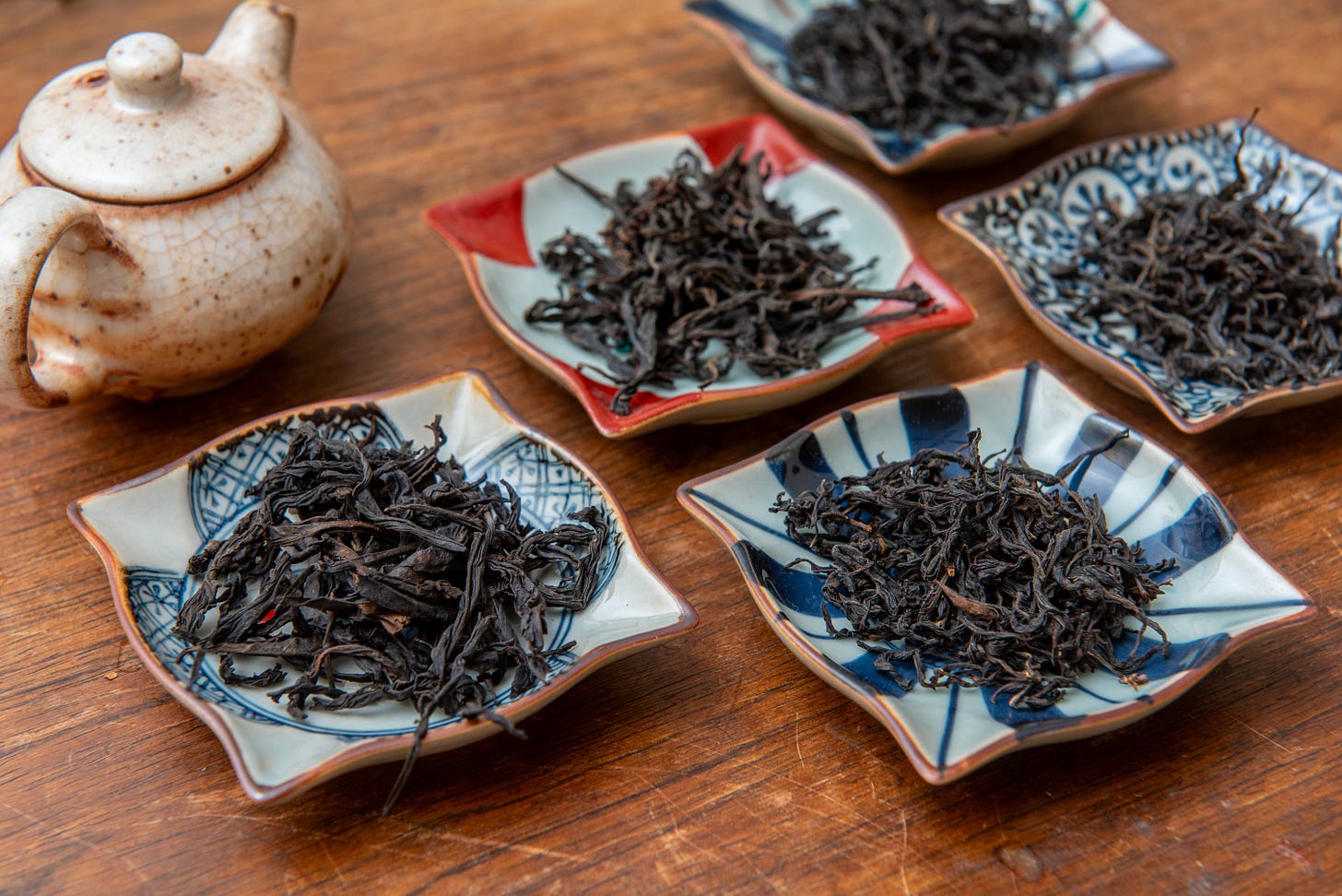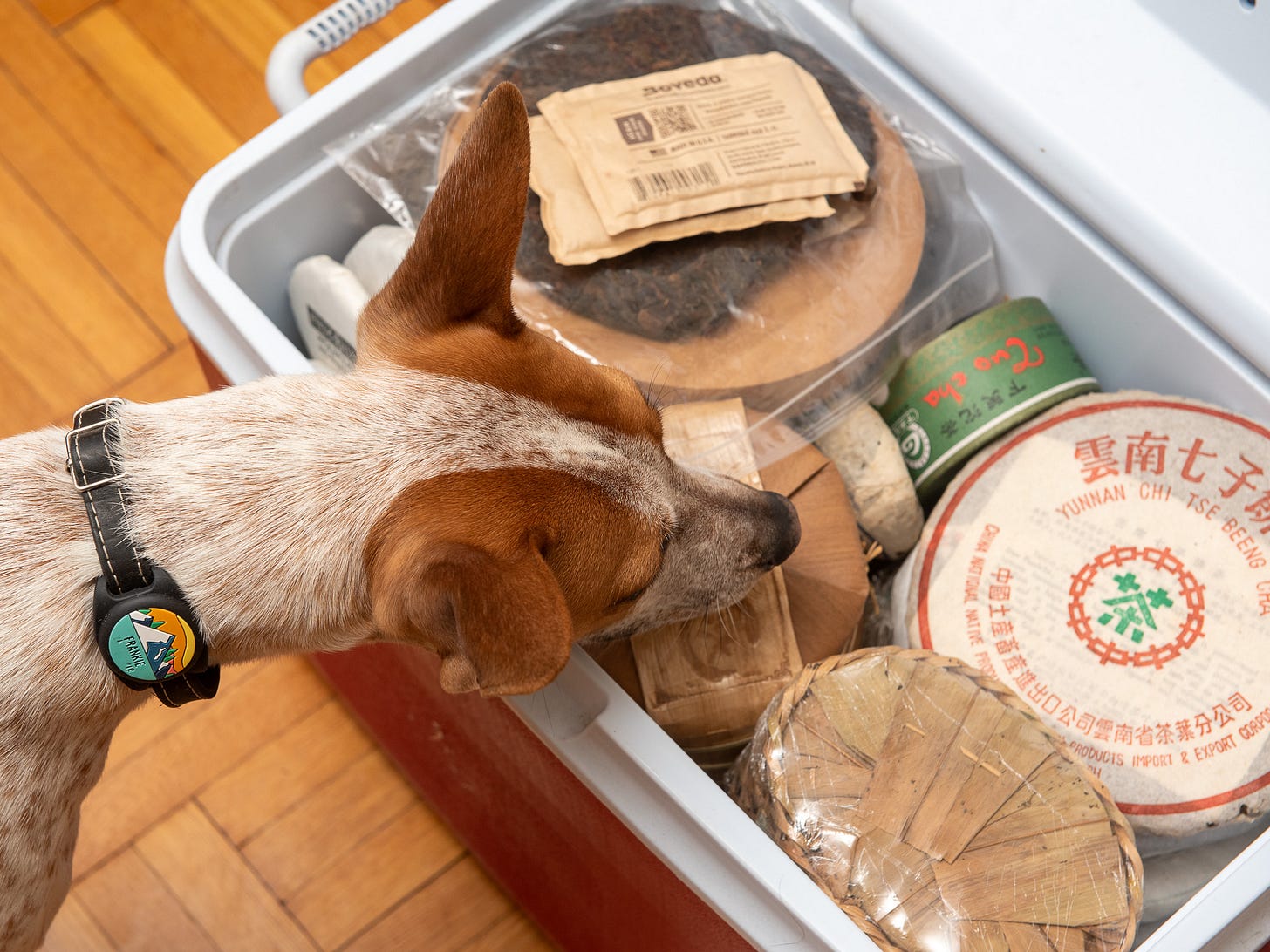Place your bids!
Bidding is now open for Leafhopper’s first ever tea sample auction. I accumulate a lot of tea by writing this newsletter and now is your chance to get a taste of the good stuff that I simply don’t have room for. Sample a region, find a new style, and taste multiple harvests over time.
Check out the auction page for full details and information on the teas available for bid. Every dime from this auction will go towards the Kentucky Health Justice Network. This is a great opportunity to try a lot of different teas at a bargain price—all while supporting trans healthcare and abortion access in a state with few options for either.
Smoke signals from Tongmu
The tea: Lapsang souchong black teas, sold by One River Tea. $7.50 to $19 for 25g.
If there’s one thing you know about lapsang souchong, you know it’s “the smoky tea.” Let me tell you a few other things. You may be interested to hear it’s the first documented black tea dating back to the 17th century. What’s more, not all lapsang is smoky. In fact at this point, most of the lapsang made in the tea’s ancestral home of Tongmuguan isn’t pine-smoked in the traditional manner. Here’s a good story about why.
The name “lapsang souchong” is applied to a lot of black teas that are treated with heavy smoke for the export market. Western drinkers have long gravitated toward this sooty style for its bacon-like flavor, so that’s what producers make for brands such as Twinings to put in teabags. The traditional lapsang made in the Tongmu region—often called zhengshan xiaozhong (roughly “small-leaf variety from the legit mountain”)—is thoroughly suffused with smoke but not dominated by it. Smoke from local pinewood enhances the tea’s mineral grip and meaty sweetness: a union of smoke and substrate that aligns more with the philosophy of barbecue than a coating of smoky flavoring. Chinese consumer trends have shifted production in this region toward smoke-free processing. Ironically, the smokier the tea, the greater likelihood it’s not from the villages that made smoked black tea famous.

The source: One River Tea is a Western-facing seller based in China that’s been direct-sourcing Chinese teas since 2018. That puts them in a dire position with Trump’s vindictive tariffs, so now’s an excellent time to show them some love. The company offers six kinds of lapsang souchong made by a five-generation family farm in the Tongmuguan nature preserve. (Watch a nice video about the farm here.) Two of those teas are infused with pine smoke during the withering and drying stages. The other four are made using modern smoke-free processing. All six of them are excellent.
To brew: I enjoy these teas with a relatively light dosage: about 4 grams in a 150 milliliter pot (~1g/37ml), steeped with water just off the boil. One River suggests skipping the conventional rinse and I agree. I begin with a 1 minute infusion for the first cup and move to longer brew times for subsequent steeps. Each of these teas should give you 6 to 8 cups of surprisingly light and elegant tea.
Tongmuguan Smoke: A classic example of traditional pine-smoked lapsang. Expansive aroma and delicate salinity that transforms into a lasting sweetness.
Tongmuguan Flower: An unsmoked version that’s more berry crumble than floral to me. My least favorite of the lot but I’d happily drink more pots.
Tongmuguan Fruit: Another unsmoked style. This one tastes as if it was scented with juicy ripe mangoes. Incredible tropical character.
Tongmuguan Spice: Tongmu isn’t far from the cliffs where Wuyi yancha is made, and this unsmoked batch has the cinnamon notes to prove it.
Masu Cinnamon: An unsmoked batch made from older trees, affording it a richer amber flavor and higher price. Beautiful spicy depth.
Masu Pinewood: My favorite of the lot and of course the most expensive. This is old tree lapsang smoked with local pine. It’s sophisticated, layered, and tastes correct, like a centuries-old tradition should. Twinings could never.










Imen at Tea Habitat introduced me to non-smoked Lapsang Souchong years back and it become my go-to work tea to enjoy mugged - when good, this is Chinese black tea at its brisk and breeziest. Simply does not oversteep. And to think, for years, I avoided all teas labeled this way for fear of a collapsing into a campfire. Would love to try some of the different styles One River offers - thanks Max 🫡
I agree with Alex. My primary experience with LS has not been one of pleasure. I'm encouraged to know there are less to no smoke varieties out there as well.